How To Write an Analytical Essay

If you enjoy exploring topics deeply and thinking creatively, analytical essays could be perfect for you. They involve thorough analysis and clever writing techniques to gain fresh perspectives and deepen your understanding of the subject. In this article, our expert research paper writer will explain what an analytical essay is, how to structure it effectively and provide practical examples. This guide covers all the essentials for your writing success!

What Is an Analytical Essay
An analytical essay involves analyzing something, such as a book, movie, or idea. It relies on evidence from the text to logically support arguments, avoiding emotional appeals or personal stories. Unlike persuasive essays, which argue for a specific viewpoint, a good analytical essay explores all aspects of the topic, considering different perspectives, dissecting arguments, and evaluating evidence carefully. Ultimately, you'll need to present your own stance based on your analysis, synthesize findings, and decide whether you agree with the conclusions or have your own interpretation.

Wednesday Addams
Mysterious, dark, and sarcastic
You’re the master of dark humor and love standing out with your unconventional style. Your perfect costume? A modern twist on Wednesday Addams’ gothic look. You’ll own Halloween with your unapologetically eerie vibe. 🖤🕸️
Wondering How to Impress Your Professor with Your Essay?
Let our writers craft you a winning essay, no matter the subject, field, type, or length!
How to Structure an Analytical Essay
Crafting an excellent paper starts with clear organization and structuring of arguments. An analytical essay structure follows a simple outline: introduction, body, and conclusion.
Introduction: Begin by grabbing the reader's attention and stating the topic clearly. Provide background information, state the purpose of the paper, and hint at the arguments you'll make. The opening sentence should be engaging, such as a surprising fact or a thought-provoking question. Then, present your thesis, summarizing your stance in the essay.
Body Paragraphs: Each paragraph starts with a clear topic sentence guiding the reader and presents evidence supporting the thesis. Focus on one issue per paragraph and briefly restate the main point at the end to transition smoothly to the next one. This ensures clarity and coherence in your argument.
Conclusion: Restate the thesis, summarize key points from the body paragraphs, and offer insights on the significance of the analysis. Provide your thoughts on the topic's importance and how your analysis contributes to it, leaving a lasting impression on the reader.
Meanwhile, you might also be interested in how to write a reflection paper , so check out the article for more information!
How to Write an Analytical Essay in 6 Simple Steps
Once you've got a handle on the structure, you can make writing easier by following some steps. Preparing ahead of time can make the process smoother and improve your essay's flow. Here are some helpful tips from our experts. And if you need it, you can always request our experts to write my essay for me , and we'll handle it promptly.
.webp)
Step 1: Decide on Your Stance
Before diving into writing, it's crucial to establish your stance on the topic. Let's say you're going to write an analytical essay example about the benefits and drawbacks of remote work. Before you start writing, you need to decide what your opinion or viewpoint is on this topic.
- Do you think remote work offers flexibility and improved work-life balance for employees?
- Or maybe you believe it can lead to feelings of isolation and decreased productivity?
Once you've determined your stance on remote work, it's essential to consider the evidence and arguments supporting your position. Are there statistics or studies that back up your viewpoint? For example, if you believe remote work improves productivity, you might cite research showing increased output among remote workers. On the other hand, if you think it leads to isolation, you could reference surveys or testimonials highlighting the challenges of remote collaboration. Your opinion will shape how you write your essay, so take some time to think about what you believe about remote work before you start writing.
Step 2: Write Your Thesis Statement
Once you've figured out what you think about the topic, it's time to write your thesis statement. This statement is like the main idea or argument of your essay.
If you believe that remote work offers significant benefits, your thesis statement might be: 'Remote work presents an opportunity for increased flexibility and work-life balance, benefiting employees and employers alike in today's interconnected world.'
Alternatively, if you believe that remote work has notable drawbacks, your thesis statement might be: 'While remote work offers flexibility, it can also lead to feelings of isolation and challenges in collaboration, necessitating a balanced approach to its implementation.'
Your thesis statement guides the rest of your analytical essay, so make sure it clearly expresses your viewpoint on the benefits and drawbacks of remote work.
Step 3: Write Topic Sentences
After you have your thesis statement about the benefits and drawbacks of remote work, you need to come up with topic sentences for each paragraph while writing an analytical essay. These sentences introduce the main point of each paragraph and help to structure your essay.
Let's say your first paragraph is about the benefits of remote work. Your topic sentence might be: 'Remote work offers employees increased flexibility and autonomy, enabling them to better manage their work-life balance.'
For the next paragraph discussing the drawbacks of remote work, your topic sentence could be: 'However, remote work can also lead to feelings of isolation and difficulties in communication and collaboration with colleagues.'
And for the paragraph about potential solutions to the challenges of remote work, your topic sentence might be: 'To mitigate the drawbacks of remote work, companies can implement strategies such as regular check-ins, virtual team-building activities, and flexible work arrangements.'
Each topic sentence should relate back to your thesis statement about the benefits and drawbacks of remote work and provide a clear focus for the paragraph that follows.
Step 4: Create an Outline
Now that you have your thesis statement and topic sentences, it's time to create an analytical essay outline to ensure your essay flows logically. Here's an outline prepared by our analytical essay writer based on the example of discussing the benefits and drawbacks of remote work:
Step 5: Write Your First Draft
Now that you have your outline, it's time to start writing your first draft. Begin by expanding upon each point in your outline, making sure to connect your ideas smoothly and logically. Don't worry too much about perfection at this stage; the goal is to get your ideas down on paper. You can always revise and polish your draft later.
As you write, keep referring back to your thesis statement to ensure that your arguments align with your main argument. Additionally, make sure each paragraph flows naturally into the next, maintaining coherence throughout your essay.
Once you've completed your first draft, take a break and then come back to review and revise it. Look for areas where you can strengthen your arguments, clarify your points, and improve the overall structure and flow of your essay.
Remember, writing is a process, and it's okay to go through multiple drafts before you're satisfied with the final result. Take your time and be patient with yourself as you work towards creating a well-crafted essay on the benefits and drawbacks of remote work.
Step 6: Revise and Proofread
Once you've completed your first draft, it's essential to revise and proofread your essay to ensure clarity, coherence, and correctness. Here's how to approach this step:
- Check if your ideas make sense and if they support your main point.
- Make sure your writing style stays the same and your format follows the rules.
- Double-check your facts and make sure you've covered everything important.
- Cut out any extra words and make your sentences clear and short.
- Look for mistakes in spelling and grammar.
- Ask someone to read your essay and give you feedback.
What is the Purpose of an Analytical Essay?
Analytical essays aim to analyze texts or topics, presenting a clear argument. They deepen understanding by evaluating evidence and uncovering underlying meanings. These essays promote critical thinking, challenging readers to consider different viewpoints.
They're also great for improving critical thinking skills. By breaking down complex ideas and presenting them clearly, they encourage readers to think for themselves and reach their own conclusions.
This type of essay also adds to academic discussions by offering fresh insights. By analyzing existing research and literature, they bring new perspectives or shine a light on overlooked parts of a topic. This keeps academic conversations lively and encourages more exploration in the field.
Analytical Essay Examples
Check out our essay samples to see theory in action. Crafted by our dissertation services , they show how analytical thinking applies to real situations, helping you understand concepts better.
With our tips on how to write an analytical essay, you're ready to boost your writing skills and craft essays that captivate your audience. With practice, you'll become a pro at analytical writing, ready to tackle any topic with confidence. And, if you need help to buy essay online , just drop us a line saying ' do my homework for me ' and we'll jump right in!
Do Analytical Essays Tend to Intimidate You?
Give us your assignment to uncover a deeper understanding of your chosen analytical essay topic!
How to Write an Analytical Essay?
What is an analytical essay.

Daniel Parker
is a seasoned educational writer focusing on scholarship guidance, research papers, and various forms of academic essays including reflective and narrative essays. His expertise also extends to detailed case studies. A scholar with a background in English Literature and Education, Daniel’s work on EssayPro blog aims to support students in achieving academic excellence and securing scholarships. His hobbies include reading classic literature and participating in academic forums.

is an expert in nursing and healthcare, with a strong background in history, law, and literature. Holding advanced degrees in nursing and public health, his analytical approach and comprehensive knowledge help students navigate complex topics. On EssayPro blog, Adam provides insightful articles on everything from historical analysis to the intricacies of healthcare policies. In his downtime, he enjoys historical documentaries and volunteering at local clinics.
.webp)
- College Essay
- Argumentative Essay
- Expository Essay
- Narrative Essay
- Descriptive Essay
- Scholarship Essay
- Admission Essay
- Reflective Essay
- Nursing Essay
- Economics Essay
Assignments
- Term Papers
- Research Papers
- Case Studies
- Dissertation
- Presentation
- Write My Assignment
- Editing Help
- Cheap Essay Writing
- How to Order
Analytical Essay Guide
Analytical Essay Example
15 Analytical Essay Samples to Learn From - Tips Included
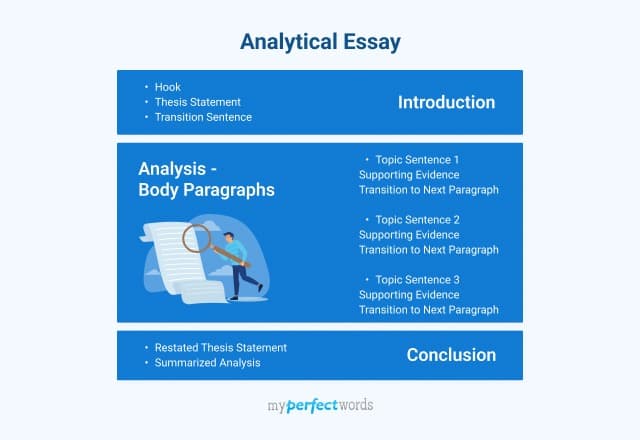
People also read
Analytical Essay Step by Step Writing Guide
Interesting Analytical Essay Topics Ideas for Students
How to Craft Analytical Essay Outline? An Easy Guide
Writing an analytical essay can be tough for students. It requires a deep understanding of the topic and the ability to break it down into smaller parts. This can cause stress, lower grades, and frustration among students.
But don't worry! We have a solution for you. In this blog, we'll give you great analytical examples and simple tips for writing amazing analytical essays.
Ready to tackle the analytical essay? Let's get started!
- 1. Understanding Analytical Writing
- 2. Analytical Essay Examples
- 3. Analytical Essay Outline Example
- 4. Analytical Essay Topics Examples
- 5. Tips to Write an Effective Analytical Essay
Understanding Analytical Writing
An analytical essay is a type of academic writing that looks into a specific subject, dissecting it into its various components and examining how they interrelate.
It requires the writer to not only present a clear understanding of the topic but also to analyze and evaluate it critically.
Unlike a descriptive essay , an analytical essay demands a more in-depth exploration, often involving an argument or thesis statement that guides the critical analysis.

Essay Deadline Approaching? Our Experts Can Help!
Analytical Essay Examples
To truly understand the art of analytical essay writing, one of the most effective methods is to examine practical examples.
Analytical essay examples provide a clear blueprint of how to approach this type of essay successfully. So, read the examples below to find inspiration for writing a clear analytical essay.
Analytical Essay Example PDF For Students
Here are some analytical essay examples for students in PDF form that you can read and download for free:
Analytical Essay Example (Pdf)
Analytical Essay Example Sample
Analytical Essay Structure
Analytical Essay Example University
Analytical Essay Example College
Analytical Essay Examples For High School
Short Analytical Essay Example
If you are still having difficulty, here are some more examples of analytical essays to help you get inspired.
How To Write An Analytical Essay - Example
APA Analytical Essay Example
Analytical Essay Example APA Format
Analytical Essay Example on A Book
Macbeth Analytical Essay Example
Analytical Essay Example Movie
Analytical Essay Outline Example
When tackling an analytical essay create an outline that is well structured. This outline serves as a roadmap, guiding you through the essay-writing process. The proper structure ensures you don't miss vital elements.
Let's break down the essential sections of an analytical essay outline with examples:
Introduction - Setting the Stage
In the introduction , your aim is to set the stage for your analysis. This section should introduce the topic, provide context, and present a clear thesis statement that outlines the main argument or focus of your essay.
Let’s take a look at another thesis statement for an analytical essay example:
Body - Analyzing Key Points
The body paragraphs of your analytical essay typically are where the real analysis takes place. This section can be divided into multiple paragraphs, each addressing a specific point or aspect related to your thesis.
Here, you should provide evidence, examples, and critical analysis to support your argument.
Conclusion - Summarize Key Points
As you reach the essay conclusion , it's time to tie it all together. Summarize your main points, restate your thesis statement, and underscore the importance of your analysis.
Remember, this is not the place to introduce new background information. Instead, offer insights and an impactful recap of your discoveries.
Conclusion for analytical essay example:
Analytical Essay Topics Examples
Choosing the right type of essay topic is an important first step when writing an analytical essay. The topic you select should be engaging, relevant, and suitable for in-depth analysis.
Here are some thought-provoking analytical essay topics to consider:
- The Symbolism of the "Green Light" in F. Scott Fitzgerald's "The Great Gatsby"
- The Impact of Social Media on Mental Health
- Analyzing the Causes and Consequences of Income Inequality
- The Role of Nature in Shakespeare's Sonnets
- Analyzing the Historical Significance of the Industrial Revolution
- The Influence of Technology on Education
- The Psychology of Marketing and Consumer Behavior
- The Impact of Globalization on Cultural Identity
- Analyzing the Ethical Dilemmas in Artificial Intelligence
- The Evolution of Environmental Policies and Their Impact on Conservation
Are you still having trouble coming up with a good analytical essay topic? Check out this blog for more than 150 compelling analytical essay topics .

Stuck on your analysis? Our expert writers can help!
Tips to Write an Effective Analytical Essay
Writing an effective analytical essay requires a structured approach and attention to detail. Here are some valuable tips to help you craft a compelling analytical essay:
- Focus Your Topic: Select a specific topic or aspect for in-depth analysis rather than a broad subject matter.
- Research Thoroughly: Gather reliable sources and evidence to support your analysis.
- Create a Well-Structured Outline: Plan your essay with a clear introduction, body, and conclusion.
- Analyze, Don't Summarize: Avoid summarizing the subject; instead, critically evaluate and interpret it.
- Use Clear Topic Sentences: Start each paragraph with a clear topic sentence that relates to your thesis.
- Provide Evidence: Support your analysis with quotes, examples, and data from your research.
- Critical Thinking: Engage in critical thinking to question assumptions and explore alternative perspectives.
- Maintain Clarity: Use clear and concise language to convey your points effectively.
In conclusion, the analytical essay stands as a potent tool for honing your skills and conveying your understanding of complex subjects.
Throughout this guide, we've uncovered the key elements of an analytical essay and the steps necessary to craft a compelling piece. If you’re tasked with writing an analytical essay, the examples provided above can offer valuable guidance.
Alternatively, if you're thinking, 'I need someone to write my essay ,' you can seek assistance from a professional analytical essay writer at MyPerfectWords.com.
We provide the best write my assignment service tailored to your needs at the most affordable rates.
So why wait? Get expert help from our analytical essay writing service and ensure your success today!
Frequently Asked Questions
What is an example of an analytical sentence.
A concise example of an analytical sentence is: In "To Kill a Mockingbird," Harper Lee uses the character of Atticus Finch to explore themes of morality and justice in the face of racial prejudice.
What is an example of analysis?
Here is an example of analysis: Through Atticus Finch's unwavering commitment to defending Tom Robinson, despite facing societal backlash, Lee highlights the importance of integrity and standing up for what is right, even in the face of adversity.

Write Essay Within 60 Seconds!

Nova Allison is a Digital Content Strategist with over eight years of experience. Nova has also worked as a technical and scientific writer. She is majorly involved in developing and reviewing online content plans that engage and resonate with audiences. Nova has a passion for writing that engages and informs her readers.
Struggling With Your Paper?
Get a custom paper written at
With a FREE Turnitin report, and a 100% money-back guarantee
LIMITED TIME ONLY!
Keep reading
-9391.jpg&w=828&q=75)
OFFER EXPIRES SOON!

Analytical Essay
Analytical essay generator.
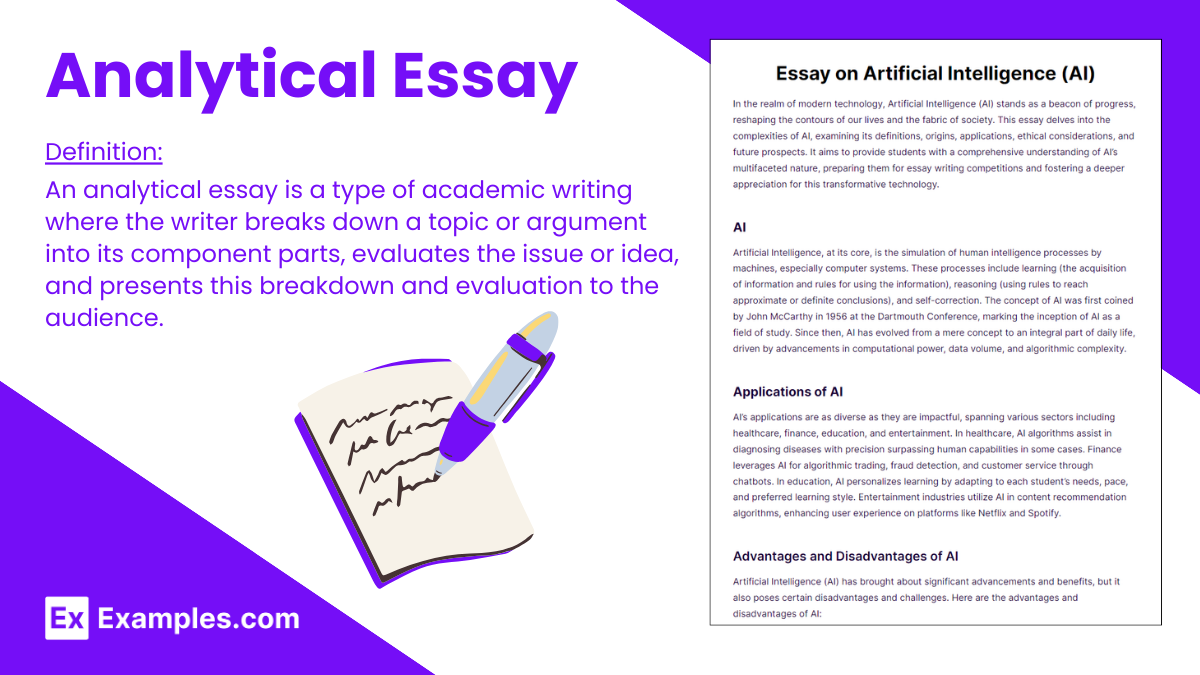
There are different types of essays which I would assume most of you are already familiar with. Persuasive essays , reflective essays , and descriptive essays are just among the few examples. Essays are rather seen important especially in the life of a student, because it is often what your grades are based on.
Knowing how to start an essay is an important in key in writing effective essay . In addition to that, your point of view will determine the kind of essay you are writing. This article will be able to help you in understanding another kind of essay, which is the analytical essay.
What is an Analytical Essay?- Definition
An analytical essay is a type of academic writing where the writer breaks down a topic or argument into its component parts, evaluates the issue or idea, and presents this breakdown and evaluation to the audience. It aims to convey a deeper understanding and insight into the subject being analyzed. Analytical essays require critical thinking and a clear argumentative structure, often addressing questions of “how” and “why.”
Structure of an Analytical Essay
An analytical essay is structured to break down and examine a specific topic, idea, or argument in depth. The goal is to present a comprehensive analysis that offers insights and a deeper understanding of the subject. Here’s how it’s typically structured:
Introduction
Hook: Start with an engaging sentence to draw in the reader. Background Information: Provide context or background necessary to understand the topic. Thesis Statement: Present a clear, concise statement that expresses the main argument or analysis that the essay will support.
Body Paragraphs
Topic Sentence: Each paragraph should start with a topic sentence that introduces the main idea of the paragraph. Analysis: Present detailed analysis of the evidence. This includes interpreting the evidence, explaining how it supports the thesis, and discussing its implications. Evidence: Include specific examples, quotations, or data that support the analysis. Make sure to properly cite sources. Link: Conclude each paragraph by linking its main idea to the thesis statement, ensuring the essay remains focused on the analysis.
Summary: Briefly summarize the key points made in the essay, reaffirming how they support the thesis. Thesis Restatement: Restate the thesis in a new way, reflecting the insights gained through the analysis. Final Thoughts: Offer final insights, reflections, or a call to action, suggesting the implications of your analysis or areas for further exploration.
Works Cited (if required)
Sources: List all sources cited in the essay in the appropriate format.
How to Write an Analytical Essay: Key Steps
- Choose Your Topic: Select a specific, analyzable topic that interests you.
- Conduct Thorough Research: Gather information from credible sources to support your analysis.
- Formulate a Thesis Statement: Develop a clear, concise thesis that outlines your essay’s main argument.
- Create an Outline: Organize your main points and evidence in a logical structure.
- Write the Essay:
Introduction : Start with a hook, provide context, and present your thesis. Body Paragraphs : Each should include a topic sentence, evidence, analysis, and a concluding sentence linking back to the thesis. Conclusion : Summarize the analysis, restate the thesis, and highlight the importance of your findings.
- Revise and Edit: Review your essay for coherence, accuracy, and errors. Ensure clarity in argumentation and evidence presentation
Analytical Essay Samples
- Essay on Artificial Intelligence (AI)
- Essay on Cyber Bullying
- Essay on Deforestation
- Essay on Discipline
- Essay on Education Rules
Analytical Essay Examples
Critical analytical.
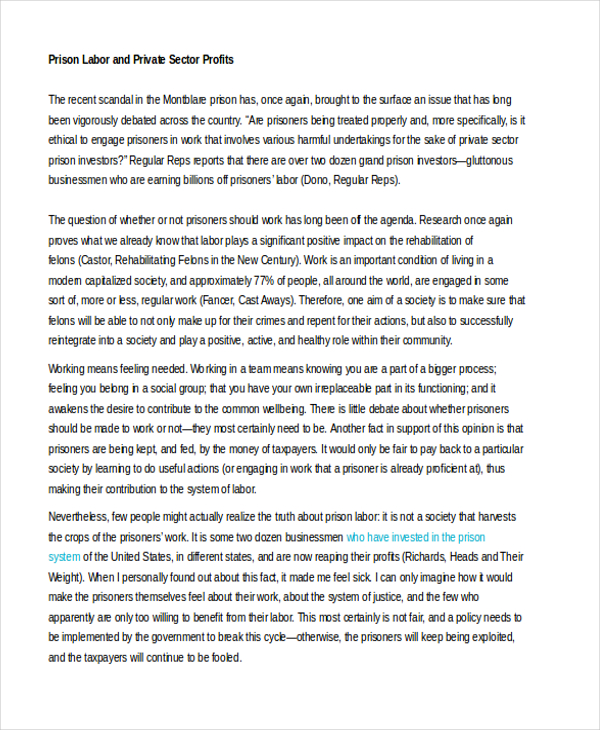
Poetry Analytical Example
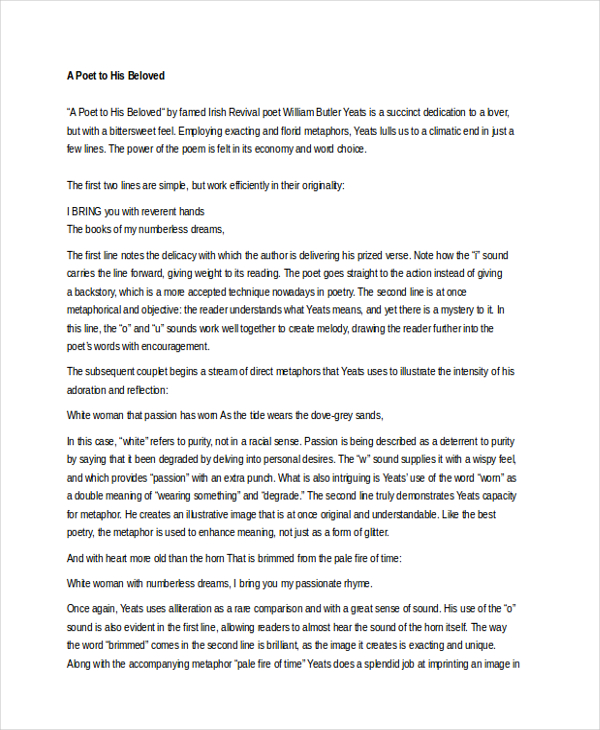
Literary Analytical Essay
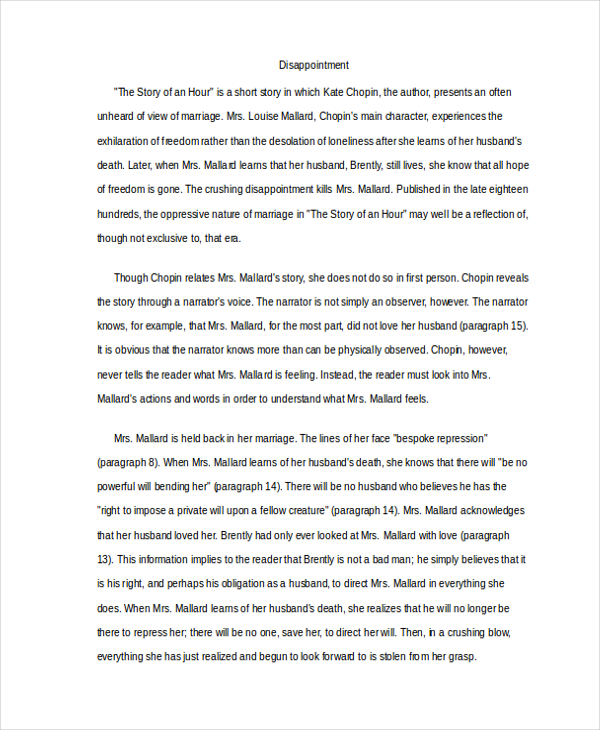
Persuasive Analytical
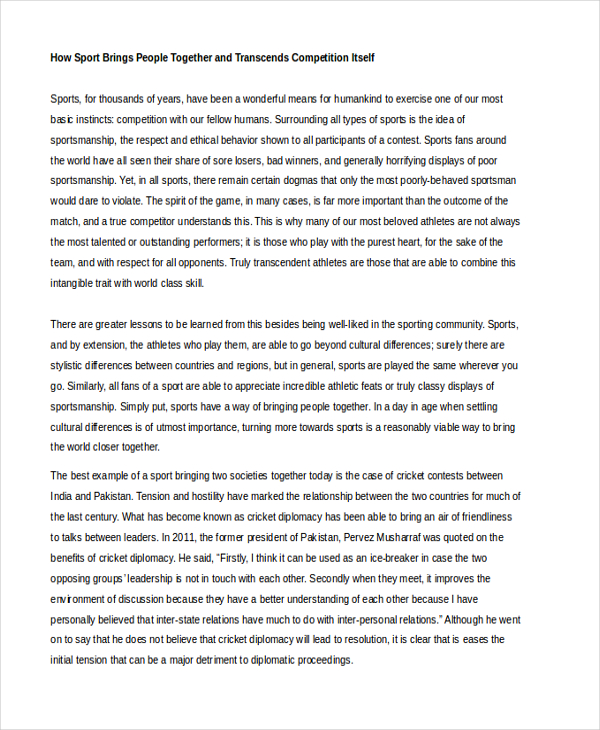
Short Analytical Sample
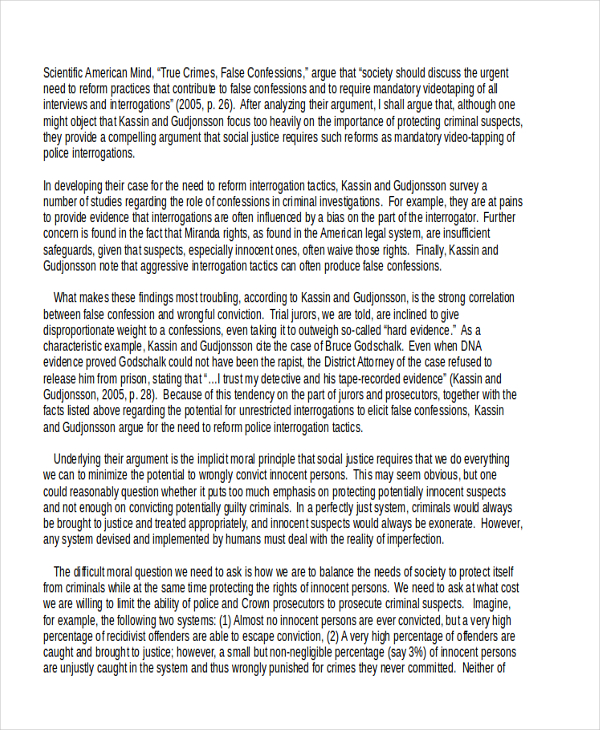
Comparative Analytical Example
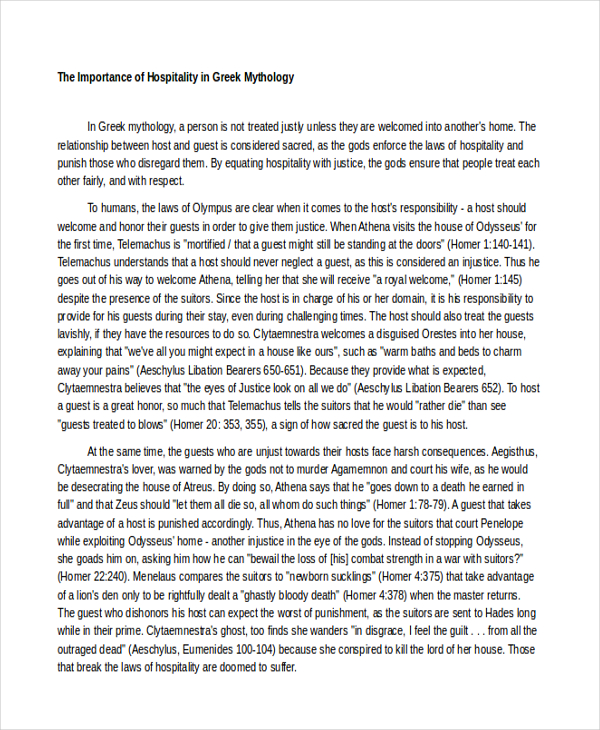
High School Analytical
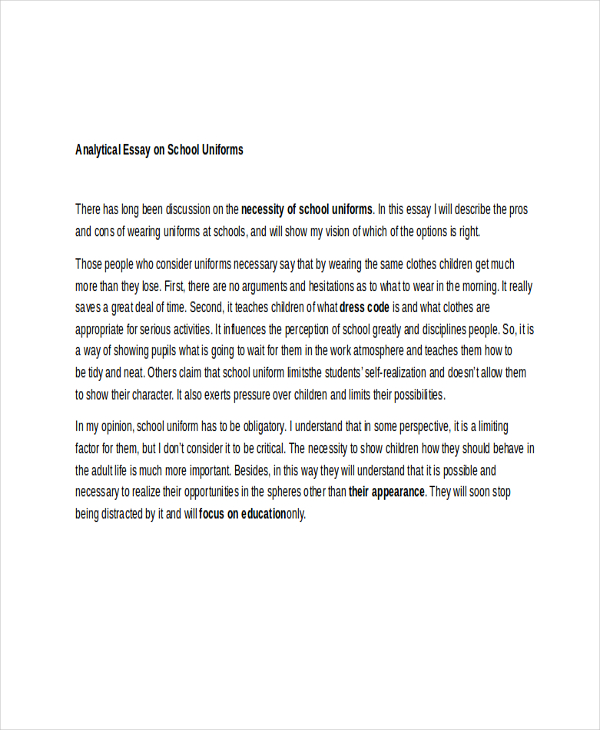
What is the Purpose of an Analytical Essay?
The purpose of an analytical essay is to break down and examine a piece of literature, film, event, or any other subject, in order to present a thorough understanding and insightful interpretation of it. This type of essay focuses on analyzing the subject’s structure, components, and underlying themes or messages. It aims to reveal deeper meanings, relationships, and complexities within the subject, encouraging readers to see beyond the surface level. Additionally, an analytical essay seeks to support its analysis with evidence, thereby fostering critical thinking and enhancing the reader’s comprehension and appreciation of the subject matter. Through this detailed examination, the essay not only contributes to academic discourse but also aids in developing the writer’s analytical and evaluative skills
Analytical Essay vs. Descriptive Essay: What’s the Difference?
The main difference between an analytical essay and a descriptive essay lies in their purpose and approach to the topic. Each serves a unique goal and employs distinct methods to achieve its objectives.
Importance of Analytical Essay
The aim of analytical essay to start is not to present a story but to analyze and it to make readers understand what the writer intends to accomplish with the essay. Some students who are asked to write an analytical essay tend to tell the readers the next scenario of the story instead of analyzing it. Remember that it is not a narrative essay, rather an essay which is aimed at analyzing the subject.
The importance of analytical essay is to provide readers a more comprehensible understanding of a story or a book by assessing all its important elements. It is a good way of practicing critical thinking by looking at a story from different angles.
How to Conclude an Analytical Essay
The conclusion of any essay, like in an expository essay , is to recap the main point in order for the readers to get a gist of the essay. This process of making a conclusion can also be applied to an analytical essay, except the writer should be able to present two important factors: the analysis and the argument .
- The analysis is the study of the main issue that is presented with its supporting elements, like the plot of the story and the characters.
- The argument is your personal response to the subject and line of reasoning based on the analysis.
How Do You Write a Text Analysis Essay?
To write a text analysis essay, start by reading the text critically to understand its themes, characters, and plot. Develop a thesis that makes a claim about the text, then organize your essay into an introduction, several body paragraphs that support your thesis with evidence from the text, and a conclusion that summarizes your analysis and reiterates the thesis.
What is the Pattern of an Analytical Essay?
The pattern of an analytical essay typically includes an introduction with a thesis statement, body paragraphs that present evidence and analysis to support the thesis, and a conclusion that summarizes the analysis and reinforces the thesis. Each body paragraph should focus on a specific aspect of the analysis.
Is an Analytical Essay a Persuasive Essay?
An analytical essay is not inherently a persuasive essay, but it can contain persuasive elements. While an analytical essay focuses on breaking down and interpreting information, a persuasive essay aims to convince the reader of a particular viewpoint. However, both may use evidence and reasoning to support their purposes.
What is the Hardest Type of Essay to Write?
The hardest type of essay to write can vary depending on the writer’s skills and interests, but many find persuasive essays challenging due to the need to effectively argue a point of view, using logic, reasoning, and evidence to convince readers to agree with a specific stance.
What is an Analytical vs Descriptive Essay?
An analytical essay breaks down and interprets various aspects of a topic to provide in-depth understanding or argument, focusing on the “how” and “why.” In contrast, a descriptive essay vividly describes a person, place, object, or event, focusing on creating a sensory experience for the reader.
Is an Analytical Essay an Expository Essay?
Yes, an analytical essay can be considered a type of expository essay. Both aim to explain or inform. However, an analytical essay specifically analyzes and interprets elements of a subject to provide deeper insight, while expository essays can also define, explain, or instruct without necessarily analyzing.
Text prompt
- Instructive
- Professional
Key Steps for Writing an Analytical Essay
Crafting Thesis Statements for Analytical Essays
Analytical Essay Outline: Structure Your Thoughts
Transition Words for Cohesive Analytical Essays
Analyzing Themes: Tips for Analytical Essays
Comparing and Contrasting in Analytical Essays
Using Evidence Effectively in Analytical Essays
Concluding Your Analytical Essay with Impact
Analytical Essay on Historical Events: How-To
Literary Analysis: Dissecting Symbolism in Texts
Analytical Essay: Definition, Types, Format & How-To Guide
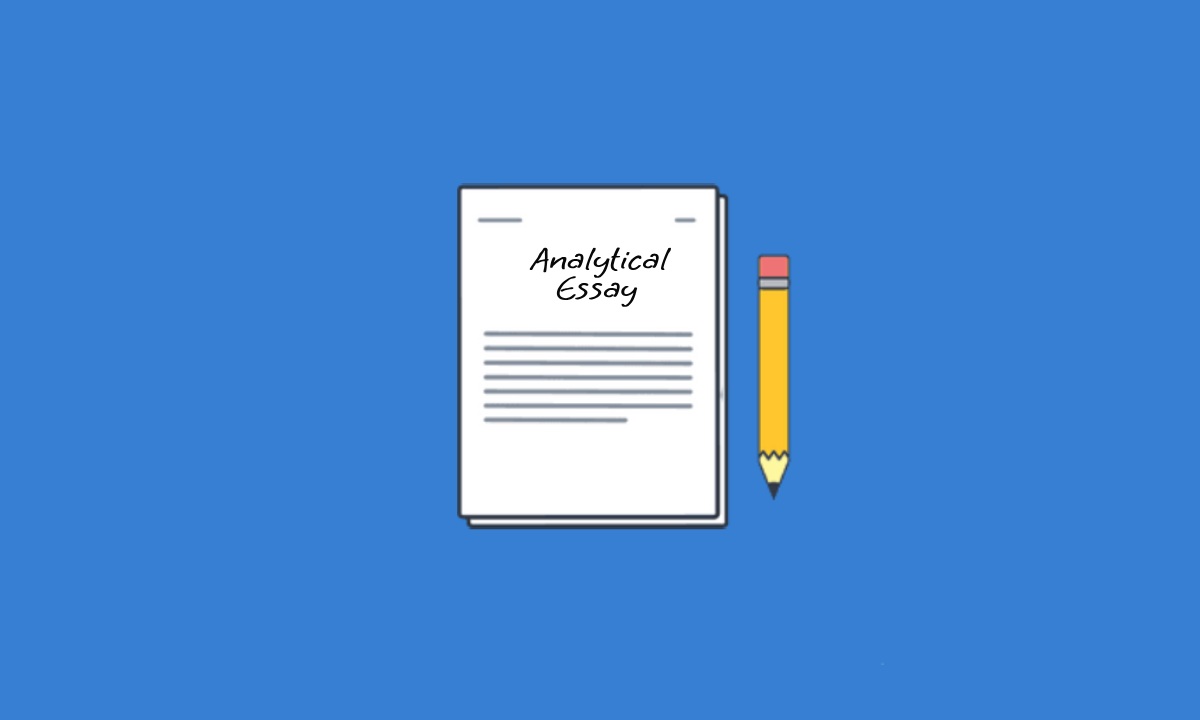
What is Analytical Essay?
An analytical essay is a type of writing that involves breaking down and examining a particular subject, such as a piece of literature, a movie, an event, or a concept, in detail. The goal of this essay is not merely to summarize the subject but to analyze and interpret it by focusing on its essential elements, such as themes, characters, arguments, or structure.
Table of Contents
Analytical Essay Types:
Analytical essays come in several types, each designed to analyze different kinds of material or to approach analysis from a unique angle. Below are some common types of analytical essays:
1. Literary Analysis Essay
A literary analysis essay focuses on analyzing a specific piece of literature, such as a novel, poem, play, or short story. The goal is to break down elements of the work—such as character development, themes, symbolism, setting, or plot—and examine how these aspects contribute to the overall meaning or message of the text. For example, you might explore how symbolism in a novel reflects the protagonist’s internal struggle or how a poem’s structure enhances its emotional impact.
2. Rhetorical Analysis Essay
In a rhetorical analysis essay, the focus is on analyzing how an author or speaker uses rhetoric to persuade or influence an audience. This involves examining the use of ethos (credibility), pathos (emotional appeal), and logos (logical reasoning) within speeches, advertisements, or other forms of communication. For instance, you might analyze a famous speech, identifying how the speaker uses persuasive techniques to build an argument and appeal to the audience’s emotions.
3. Character Analysis Essay
A character analysis essay focuses on one or more characters in a literary work, film, or other narrative form. The objective is to analyze the character’s personality, motivations, relationships, and growth throughout the story. This type of essay often examines how the character’s traits influence their actions and the overall plot, as well as how they contribute to the themes of the work. For example, you might write a character analysis of Hamlet, exploring how his indecision and inner conflict affect his downfall.
4. Process Analysis Essay
A process analysis essay examines and explains how something is done or how something works, often step by step. This type of essay is less about forming an argument and more about providing a detailed explanation of a process. The analysis might cover everything from a scientific method to a cooking recipe, or how an organization runs. For example, you could analyze the steps involved in conducting an experiment or creating a successful business plan.
5. Cause and Effect Analysis Essay
This type of essay examines the causes of a particular event or phenomenon and its effects. In a cause-and-effect analysis, you explore the relationship between variables, looking at how one event leads to another. This type of essay is often used to understand social, historical, or scientific phenomena. For example, you could analyze the causes of climate change and its potential impact on global ecosystems, or explore how technological advancements have influenced modern education.
6. Comparative Analysis Essay
A comparative analysis essay compares two or more subjects, ideas, or texts, highlighting their similarities and differences. The goal is to provide an in-depth examination that allows for a greater understanding of the subjects. Comparative essays can be applied to literature, historical events, theories, or other forms of analysis. For instance, you might compare two novels, analyzing how each explores themes of identity or freedom.
7. Critical Analysis Essay
A critical analysis essay evaluates a piece of work, idea, or issue in a detailed and objective manner. The goal is to assess the strengths and weaknesses of the material being analyzed. This type of essay requires the writer to engage with the work on a deeper level, offering insights beyond surface-level observations. For example, you could write a critical analysis of a film, discussing its direction, cinematography, and thematic elements while also offering your own perspective on its effectiveness.
8. Poetry Analysis Essay
A poetry analysis essay focuses specifically on dissecting a poem’s structure, form, language, and meaning. In this type of essay, the writer explores how the poet uses literary devices—such as meter, rhyme, imagery, and figurative language—to convey emotion or thematic depth. The essay might also explore how the poem fits within a particular literary movement or how it reflects the poet’s historical context.
Analytical Essay Format:
An analytical essay format typically follows a structured outline to present a clear argument and analysis. Here’s a common format:
1. Introduction
Hook: A compelling opening to engage the reader (quote, fact, question). Background Information: Brief context about the text, issue, or topic being analyzed. Thesis Statement: A clear and concise statement that outlines the main argument or point of analysis.
2. Body Paragraphs (usually 3-5 paragraphs)
Each paragraph should focus on a single point that supports the thesis.
Topic Sentence: Introduces the main idea of the paragraph. Evidence: Provide quotes, data, or examples from the text or research to support the claim. Analysis: Explain how the evidence supports your argument, providing critical insights or interpretation. Transition: Smoothly link to the next paragraph.
3. Counterargument and Refutation (Optional)
Counterargument: Present a viewpoint that opposes your thesis. Refutation: Disprove or explain why the counterargument is less valid or relevant to your thesis.

4. Conclusion
Restate Thesis: Summarize the thesis in different words. Summarize Key Points: Recap the main points of the essay. Closing Statement: End with a final thought or call to action that leaves an impact.
How to Write Analytical Essay?
Writing an analytical essay involves breaking down a subject into its components, examining these parts, and presenting your interpretation or analysis. Here’s a step-by-step guide on how to write an analytical essay:
1. Understand the Assignment
Before starting, carefully read the essay prompt to ensure you understand what is being asked. Identify the subject or text you need to analyze, and pay attention to any specific questions or instructions provided. Determine the purpose of the analysis—whether it’s to interpret a literary work, examine a historical event, or assess the effectiveness of an argument.
2. Choose a Topic
If the topic isn’t provided, select a subject or text that you find interesting and is suitable for analysis. Make sure your topic is narrow enough to explore in depth but broad enough to find sufficient evidence. For example, if analyzing a novel, you might focus on a specific character, theme, or literary device.
3. Develop a Thesis Statement
The thesis statement is the central argument of your essay. It should clearly state what you are analyzing and what conclusion you have reached about the subject. Your thesis should be specific and arguable, meaning it should present a claim that can be supported with evidence. For example, instead of saying “Shakespeare uses symbolism,” a more effective thesis would be, “Shakespeare uses the symbol of blood in Macbeth to represent guilt and the characters’ psychological turmoil.”
4. Gather Evidence
Once you have a thesis, collect relevant evidence that supports your analysis. Depending on the type of essay, this could include quotes from a text, historical facts, research findings, or examples. Make sure to gather enough evidence to back up your claims and provide a deep analysis. When using quotes or data, be sure to explain how it relates to your thesis.
5. Create an Outline
An outline helps organize your thoughts and structure your essay logically. A typical analytical essay follows this structure:
- Introduction: Introduce the subject and provide your thesis statement.
- Body Paragraphs: Each paragraph should focus on a specific aspect of your analysis and provide evidence to support it.
- Conclusion: Summarize your analysis and restate your thesis.
6. Write the Introduction
Begin your essay with an engaging hook that grabs the reader’s attention. This can be a quote, a rhetorical question, or an interesting fact related to your topic. After the hook, provide some background information about the subject, helping the reader understand the context. Conclude the introduction with your thesis statement, which sets the direction for the entire essay.
7. Write the Body Paragraphs
Each body paragraph should focus on a specific point that supports your thesis. Start each paragraph with a topic sentence that introduces the main idea of the paragraph. Follow it with evidence such as quotes, data, or examples, and then analyze how that evidence supports your argument. Be sure to explain the significance of the evidence and how it connects to your thesis. End each paragraph with a transition that leads to the next point.
8. Address Counterarguments
If applicable, consider including a paragraph that addresses a counterargument or an alternative perspective. Present this viewpoint and then refute it with evidence, showing why your thesis is still valid. This adds depth to your analysis and demonstrates critical thinking.
9. Write the Conclusion
In the conclusion, restate your thesis in a new way to reflect the analysis you’ve presented. Summarize the key points you made in the body paragraphs, and explain how they collectively support your thesis. End with a strong closing statement that might reflect on the broader implications of your analysis or pose a final thought-provoking question.
10. Revise and Edit
After completing your first draft, take time to revise and improve it. Look for any gaps in your argument or areas where your analysis could be clearer. Make sure each paragraph transitions smoothly, and check for clarity in your thesis and evidence. Finally, proofread the essay for grammatical, spelling, and punctuation errors.
Analytical Essay Topics:
Below are topic ideas for different types of analytical essays:
1. Literary Analysis Essay Topics
- Analyze the theme of power and corruption in Animal Farm by George Orwell.
- Explore how the setting in Wuthering Heights influences the characters’ behavior and development.
- Analyze the use of symbolism in F. Scott Fitzgerald’s The Great Gatsby.
- Examine how Harper Lee portrays racial injustice in To Kill a Mockingbird.
- Analyze the portrayal of ambition in William Shakespeare’s Macbeth.
2. Rhetorical Analysis Essay Topics
- Analyze Martin Luther King Jr.’s use of pathos in his “I Have a Dream” speech.
- Explore the rhetorical strategies used in John F. Kennedy’s inaugural address.
- Analyze how ethos, pathos, and logos are used in a popular commercial or advertisement.
- Examine how Malala Yousafzai uses rhetoric in her United Nations speech.
- Analyze the persuasive techniques in a TED Talk of your choice.
3. Character Analysis Essay Topics
- Analyze the character of Elizabeth Bennet in Jane Austen’s Pride and Prejudice.
- Explore the character transformation of Walter White in Breaking Bad.
- Analyze the tragic flaw of Hamlet in Shakespeare’s Hamlet.
- Examine the role of Scout Finch as a narrator in To Kill a Mockingbird.
- Analyze the motivations behind Jay Gatsby’s actions in The Great Gatsby.
4. Process Analysis Essay Topics
- Explain the process of preparing a traditional dish from a specific culture.
- Analyze the steps required to write an effective college application essay.
- Describe the process of photosynthesis in plants and its significance.
- Analyze the steps involved in conducting a scientific experiment, such as growing crystals.
- Explain the process of setting up a small business, from idea to execution.
5. Cause and Effect Analysis Essay Topics
- Analyze the causes and effects of social media on teenagers’ mental health.
- Examine the causes of climate change and its potential effects on the environment.
- Analyze the effects of video games on children’s behavior and learning.
- Explore the causes and long-term effects of the Civil Rights Movement in the United States.
- Analyze the impact of technological advancements on modern education.
6. Comparative Analysis Essay Topics
- Compare and contrast the themes of love and jealousy in Othello and Romeo and Juliet.
- Compare the dystopian worlds in 1984 by George Orwell and Brave New World by Aldous Huxley.
- Compare the portrayals of heroism in The Odyssey and The Iliad by Homer.
- Compare the characters of Katniss Everdeen in The Hunger Games and Tris Prior in Divergent.
- Compare and contrast how power is used by the main characters in Lord of the Flies and The Crucible.
7. Critical Analysis Essay Topics
- Critically analyze the effectiveness of the portrayal of artificial intelligence in the movie Her.
- Analyze the strengths and weaknesses of the argument in Silent Spring by Rachel Carson.
- Critically evaluate the impact of fast fashion on the environment.
- Analyze the role of social media in shaping political opinions during elections.
- Critically analyze the portrayal of mental illness in The Bell Jar by Sylvia Plath.
8. Poetry Analysis Essay Topics
- Analyze the use of imagery in Robert Frost’s poem The Road Not Taken.
- Examine the theme of death in Emily Dickinson’s poem Because I Could Not Stop for Death.
- Analyze the use of symbolism in William Blake’s poem The Tyger.
- Explore the concept of identity in Langston Hughes’ poem I, Too.
- Analyze the theme of love and loss in W.B. Yeats’ poem When You Are Old.
Analytical Essay Example
Below is an example of an analytical essay. This essay focuses on a literary analysis, specifically on the theme of ambition in Shakespeare’s Macbeth:
Title: The Destructive Nature of Ambition in Shakespeare’s Macbeth
Introduction
In William Shakespeare’s tragedy Macbeth, the theme of unchecked ambition plays a central role in the downfall of the main characters. Macbeth, a Scottish general, begins as a valiant warrior, but his ambition to become king ultimately leads to his ruin. Through the character arcs of both Macbeth and Lady Macbeth, Shakespeare demonstrates how ambition, when left unchecked by moral boundaries, can lead to destructive consequences. The play illustrates the corrosive effects of ambition on both individuals and the natural order.
Body Paragraph 1: The Initial Spark of Ambition
Macbeth’s ambition is first ignited when he encounters the three witches on the heath. Their prophecy that he will become king plants the seed of ambition in his mind. This moment marks a turning point for Macbeth, as he begins to wrestle with the idea of achieving power through immoral means. Although initially hesitant, his ambition quickly overpowers his moral judgment. This is evident in Macbeth’s soliloquy in Act 1, Scene 7, where he debates the pros and cons of murdering King Duncan. He acknowledges that Duncan is a good and virtuous king, but his desire for power clouds his ethical considerations. Shakespeare uses this internal conflict to show the dangerous allure of ambition when it conflicts with moral reasoning.
Body Paragraph 2: The Role of Lady Macbeth
Lady Macbeth also plays a pivotal role in fueling her husband’s ambition. Unlike Macbeth, who experiences internal doubt, Lady Macbeth is resolute and ruthless in her pursuit of power. She manipulates Macbeth, questioning his masculinity and courage, ultimately persuading him to commit the murder of Duncan. In Act 1, Scene 5, Lady Macbeth famously declares her willingness to commit the darkest deeds in order to see her husband crowned king. Her ambition is not only for Macbeth’s success but also for her own advancement. Shakespeare uses Lady Macbeth to demonstrate how ambition can be a shared, consuming force that affects relationships and moral judgment.
Body Paragraph 3: The Consequences of Ambition
The consequences of unchecked ambition become apparent after Duncan’s murder. Macbeth, once a noble and honorable figure, transforms into a tyrant consumed by paranoia and guilt. He becomes obsessed with securing his power, leading to further violence, including the murder of Banquo and Macduff’s family. Lady Macbeth, who initially appeared stronger and more determined, also suffers from the consequences of their actions. Her guilt manifests in intense psychological distress, as seen in her sleepwalking scene in Act 5, where she tries to wash imagined bloodstains from her hands. This deterioration of both characters highlights the destructive power of ambition when it is pursued without regard for ethics or humanity.
Body Paragraph 4: Ambition’s Impact on the Natural Order
Shakespeare not only explores the personal consequences of ambition but also its impact on the natural and political order. The murder of King Duncan disrupts the natural hierarchy, leading to chaos in the kingdom. As Macbeth seizes the throne through violence, the rightful order of kingship is upended, leading to rebellion and unrest throughout Scotland. Shakespeare emphasizes the idea that ambition, when pursued immorally, can destabilize not only individuals but also the entire fabric of society. This is evident when nature itself reflects the turmoil caused by Duncan’s murder, with storms and unnatural occurrences symbolizing the disruption of moral order.
Through the characters of Macbeth and Lady Macbeth, as well as the wider political and natural consequences, Shakespeare’s Macbeth serves as a cautionary tale about the dangers of unchecked ambition. The play demonstrates that ambition, when not tempered by morality and ethical considerations, can lead to personal, relational, and societal destruction. Macbeth’s tragic downfall illustrates how ambition can corrupt, destroy, and destabilize both individuals and the world around them. Ultimately, Shakespeare warns that the pursuit of power at any cost comes with a steep price.
Related Posts
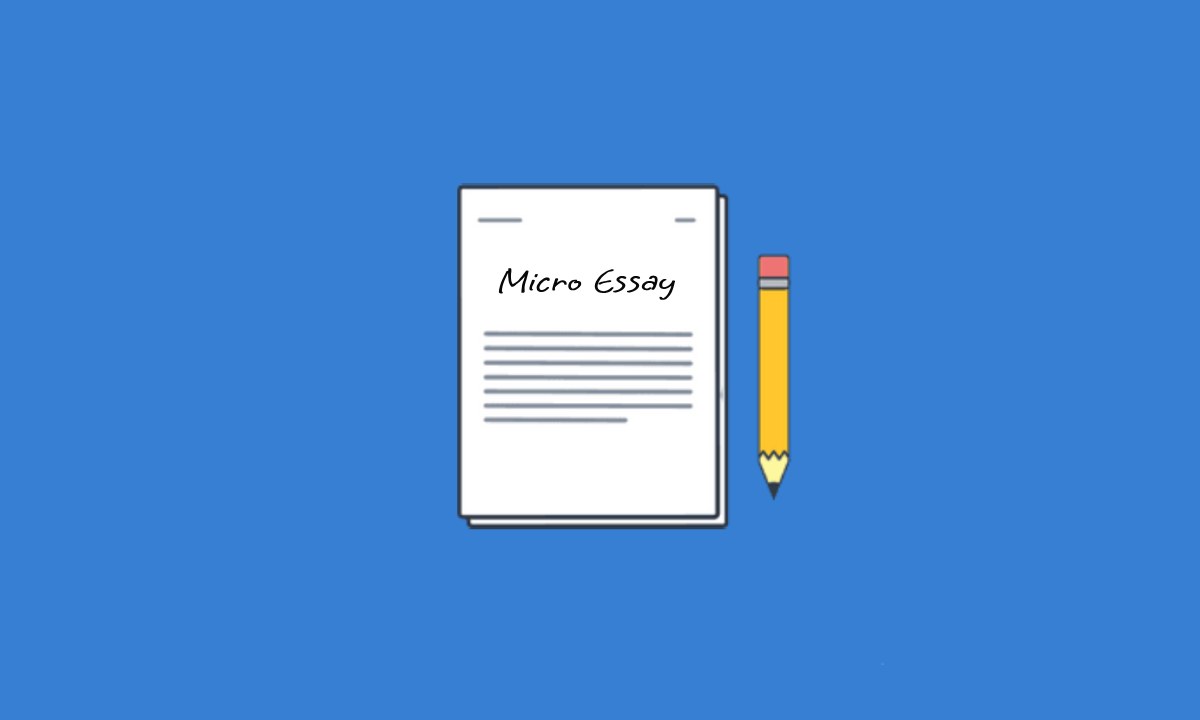
What is a Micro Essay?
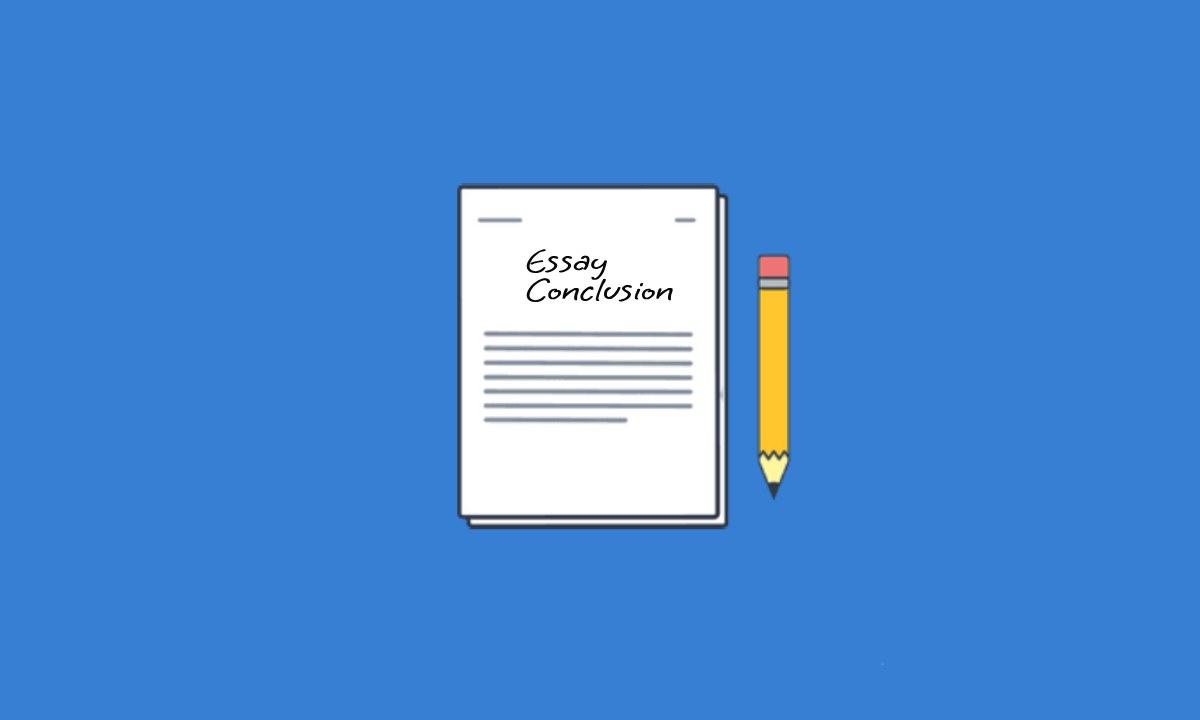
How to Write Conclusion of Essay or Text
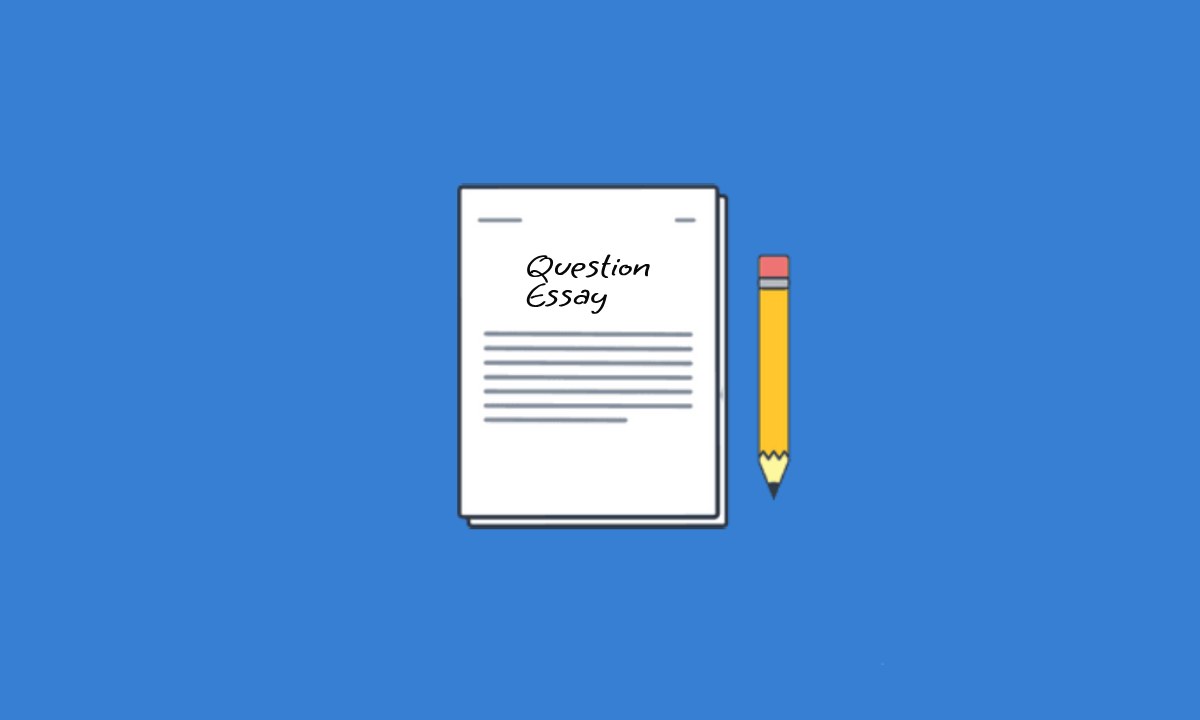
Question Essay: Format, Topics, Example & How-To Guide
Analytical Essay
Definition of analytical essay.
Analytical implies the breaking down of something into parts, or the discussion of something in a way that it becomes a dissection of the whole. An analytical type of essay differs from other types of essays in that its primary goal is to explain something bit by bit to enhance understanding. Most of the times, an analytical essay is written about the analysis of a text, or a process, or an idea. In literature, however, it is a critical analysis of some literary text which is done to enhance its understanding.
Difference Between an Analytical Essay and a Critical Essay
An analytical essay is just an analysis of a literary text. By contrast , a critical essay involves, not only an analysis of the text in question, but also dissection of the literary terms and devices used by the author to make his meanings clear. The critical essay also explains the functions of the literary terms used, and evaluates their usage, and whether they have achieved the intended purposes or not.
Types of Analytical Essay
- Cause and Effect : One way of analyzing something is to discuss the cause of something, and its effect on other things.
- Comparison and Contrast : Another way of analyzing something is to compare and contrast things among themselves.
- Classification : Classification is yet another method of analyzing things, to learn of their nature.
- Process : Process is also a type of analysis writing.
- Definition : Defining things is also a way of analyzing the nature of things.
Examples of Analytical Essay in Literature
Example #1: liposuction: the key to energy independence (by barbara ehrenreich).
“I say to my fellow humans: It’s time to stop feeding off the dead and grow up! I don’t know about food, but I have a plan for achieving fuel self-sufficiency in less time than it takes to say ‘Arctic National Wildlife Refuge.’ The idea came to me from reports of the growing crime of French fry oil theft: Certain desperate individuals are stealing restaurants’ discarded cooking oil, which can then be used to fuel cars. So the idea is: why not skip the French fry phase and harvest high-energy hydrocarbons right from ourselves?”
This is an excerpt from the essay of Barbara Ehrenreich, in which she has made comparison and contrast between human beings and animals , regarding food choices . This is a good analysis of the food we use.
Example #2: Freedom (by Joyce M. Jarett)
“On the first day of school, I was escorted by hordes of national guardsmen. Like a funeral procession, the steady stream of official-looking cars followed me to the campus. Some patrolmen were parked near campus gates, while others, with guns strapped to their sides, stood near building entrances. Though many of my escorts had given me smiles of support, still I was not prepared for what I encountered upon entering my new school.”
This is a paragraph from a process analysis. The author, Joyce M. Jaret, has beautifully described her experience of the security in this paragraph, and how it is deployed when an important figure faces security issues in his life. This is an analysis of the process of security deployment.
Example #3: The Ways of Meeting Oppression (by Martin Luther King, Jr.)
“The third way open to oppressed people in their quest for freedom is the way of nonviolent resistance. Like the synthesis in Hegelian philosophy, the principle of nonviolent resistance seeks to reconcile the truths of two opposites—the acquiescence and violence—while avoiding the extremes and immoralities of both. The nonviolent resister agrees with the person who acquiesces that one should not be physically aggressive toward his opponent; but he balances the equation by agreeing with the person of violence that evil must be resisted. He avoids the nonresistance of the former and the violent resistance of the latter. With nonviolent resistance, no individual or group need submit to any wrong, nor need anyone resort to violence in order to right a wrong.”
This is the analysis by classification that Marth Luther King, a famous human rights activist, has done regarding oppression against African Americans.
Function of Analytical Essay
An analytical essay dissects something such as a concept, an idea, a thing, or even a character . Its major aim is to enhance the understanding of readers. An analysis could be done through a process, definition, classification and division, or comparison and contrast. The thing or idea is broken into several parts, through classification and division, and then analyzed. A process is broken into several steps for analysis. Not only do analytical essays enhance understanding, but they also make readers aware of minute details of things.
Related posts:
- Elements of an Essay
- Narrative Essay
- Definition Essay
- Descriptive Essay
- Types of Essay
- Argumentative Essay
- Cause and Effect Essay
- Critical Essay
- Expository Essay
- Persuasive Essay
- Process Essay
- Explicatory Essay
- An Essay on Man: Epistle I
- Comparison and Contrast Essay
Post navigation

How to Write an Analytical Essay Step by Step Guide and Examples
What You'll Learn
What is an Analytical Essay?
An analytical essay is a type of academic writing in which a complicated topic or idea is broken down into smaller parts, analyzed and looked at, and a well-structured argument or evaluation is given. The main purpose of an analytical essay is to show that the writer has a deep understanding of the topic and can also think critically about it.
In analytical essays, students must look at and evaluate different sources, find patterns and relationships, and come to meaningful conclusions.
- When students write analytical essays, they also improve their research skills because they have to find relevant information from multiple sources and put it all together in a logical argument.
- Also, analytical essays are important in academic writing because they help students understand ideas, theories, and concepts that are hard to understand.
- By breaking a topic down into smaller parts, students can better understand it and figure out what the main ideas and themes are. Analytical essays help students get better at writing by making them present their arguments in a way that is clear, concise, and well-organized.
- Writing an analytical essay is a skill that students need to learn if they want to do well in school and in their careers. For analytical essays, you need to be able to think critically, do research, and write well, all of which are important for success in many fields.
- By getting better at these skills, students can become better writers and thinkers, which will help them reach their academic and career goals.
Basics of Analytical Essays
There are a few main things that set an analytical essay apart from other types of essays. One of the most important things about it is that it requires a thorough look at the subject. An analytical essay isn’t just a description of a topic or a point of view. Instead, it calls for a thorough look at the subject, breaking it down into its different parts and evaluating each one carefully.
In an analytical essay, you can’t say enough about how important analysis is. Analysis is the process of breaking down big ideas or thoughts into smaller, more manageable pieces. By analyzing the topic, the writer can find the main ideas, patterns, and connections, which can then be used to back up their arguments .
Also, analysis lets the author draw conclusions that make sense based on the evidence given. If there wasn’t any analysis in an analytical essay, it would just be a list of facts and opinions. Analysis is what gives depth and substance to an analytical essay and lets the writer make a well-reasoned, evidence-based argument.
Analytical essays are different from other types of essays because they focus on analysis and evaluation. They require a thorough look at a subject, breaking it down into its different parts and judging each one objectively. Students can get the skills they need to do well in school and in the workplace by learning what makes an analytical essay unique and what role analysis plays in this type of writing.
How to Write an Analytical Essay Step by Step Guide
Step 1: choosing a topic for your analytical essay.
It can be hard to decide what to write about in an analytical essay, but there are several ways to come up with ideas. One way to do this is to make a list of possible topics based on your interests, your schoolwork, or what’s going on in the world right now. You can also find possible topics by reading articles, books, or other materials in your field of study. When choosing a topic for your analytical essay, you should think about a few things. First and foremost, the topic must fit with the needs of the course or assignment. It should also be narrow enough to allow for a detailed analysis while still having enough information for research. Also, the topic should be something you’re interested in as a writer. This will make the writing process more interesting and fun.
To help you get started, here are some examples of potential analytical essay topics:
- The impact of social media on mental health
- Analyzing the themes of race and identity in Toni Morrison’s “Beloved”
- The role of technology in modern education
- An analysis of the effectiveness of the Affordable Care Act
- Examining the causes and consequences of income inequality in the United States
- The portrayal of gender roles in Shakespeare’s plays
- Analyzing the impact of climate change on global food production
- A critical analysis of the role of the media in shaping public opinion
- A comparison of different political ideologies and their impact on society
- An analysis of the ethical implications of gene editing technology.
A topic for an analytical essay must be chosen with care, taking into account several factors such as relevance, scope, and personal interest. By brainstorming ideas, researching different sources, and applying these criteria, you can choose a topic that is both interesting and informative, allowing you to write a well-researched and well-argued analytical essay.
Step 2: Conducting Research for Your Analytical Essay
In order to write an analytical essay, you need to do research. It lets the writer gather relevant information, find patterns and relationships, and come to conclusions that make sense. If you didn’t do research for your analytical essay, it wouldn’t have much substance or credibility, and the arguments you made would be weak and not backed up. You can gather information for your analytical essay from a number of different places. There are many examples, such as books, academic journals, online databases, government reports, and reputable news sources. When choosing sources, think about how relevant, reliable, and trustworthy they are. Academic sources like peer-reviewed journals and scholarly books are more reliable and credible than popular sources like blogs and social media posts.
To conduct effective research for your analytical essay, here are some tips to keep in mind:
- Start early: Give yourself plenty of time to conduct research, as it can be a time-consuming process.
- Use multiple sources: Gather information from a variety of sources to ensure you have a well-rounded understanding of the topic.
- Take notes: Keep detailed notes on the information you gather, including the source and page number, to make it easier to cite your sources later.
- Evaluate your sources: Assess the reliability and credibility of your sources, looking for biases or conflicts of interest that may affect the information presented.
- Organize your research: Create a system for organizing your research, such as using annotated bibliographies or note-taking apps, to keep track of your sources and ideas.
You can conduct effective research for your analytical essay by following these tips, gathering reliable and credible information that supports your arguments and improves the overall quality of your writing.
Step 3: Developing a Thesis Statement for Your Analytical Essay
A thesis statement is a short sentence that sums up the main argument or point of an essay. It gives the reader a clear idea of where the author stands on the subject and acts as a road map. In an analytical essay, the thesis statement is very important because it sets the tone for the whole essay and shows the writer how to analyze and evaluate the subject.
A strong thesis statement is the backbone of your analytical essay. It should:
- Clearly state your main argument or point of view
- Be specific and focused
- Provide a roadmap for your essay
- Be supported by evidence from your research
Example thesis statement: “The widespread use of social media platforms has led to increased rates of anxiety and depression among teenagers due to constant social comparison, cyberbullying, and decreased face-to-face interactions.”
In an analytical essay, you can’t say enough about how important a strong thesis statement is. A well-written thesis statement states the writer’s main point in a clear and concise way, making it easier for the reader to follow the writer’s thought process and understand the purpose of the essay. A strong thesis statement also helps the writer focus their analysis and evaluation, making sure that each paragraph supports the main point and builds on it.
How to develop a strong analytical essay thesis statement
- Start with a question: Ask yourself a question related to your topic and use the answer to develop your thesis statement.
- Be specific: Your thesis statement should be specific and focused on the main argument of your essay.
- Use evidence: Support your thesis statement with evidence from your research, such as quotes or statistics, to give it more credibility and strength.
- Be original: Your thesis statement should be unique and original, providing a fresh perspective on the topic.
- Revise as needed: As you write your essay, revisit your thesis statement and revise it if necessary to ensure it remains relevant and accurate.
By following these tips, you can develop a strong thesis statement for your analytical essay, providing a clear and concise statement of your main argument and guiding the reader through your analysis and evaluation of the topic.
Step 4: Create an Analytical Essay Structure/Outline
An analytical essay is made up of an introduction, body paragraphs, and a conclusion.
A well-structured analytical essay typically includes:
- Introduction
- Body paragraphs (usually 3-5)
Analytical Essay outline
A basic outline might look like this:
I. Introduction A. Hook B. Background C. Thesis II. Body Paragraph 1 A. Topic Sentence B. Evidence C. Analysis III. Body Paragraph 2 A. Topic Sentence B. Evidence C. Analysis IV. Body Paragraph 3 A. Topic Sentence B. Evidence C. Analysis V. Conclusion A. Restate Thesis B. Summarize Main Points C. Final Thoughts
Step 5: Writing an Analytical Essay:
An analytical essay is characterized by:
- A clear thesis statement presenting the main argument
- In-depth analysis and evaluation of evidence
- Logical structure with well-developed paragraphs
- Use of formal, academic language
- Objective tone
Unlike argumentative or persuasive essays that aim to convince the reader of a specific viewpoint, analytical essays focus on examining and evaluating information to reach a conclusion.
Tips for writing analytical essays a step by step guide
- Use clear, concise language
- Employ analytical verbs (e.g., analyze, evaluate, interpret)
- Incorporate transitional phrases to connect ideas
- Use evidence to support your claims
- Consider counterarguments to strengthen your analysis
- Maintain an objective tone
How to Start an Analysis Essay: Writing Your Introduction
The introduction of your analytical essay sets the stage for your entire analysis. It should engage the reader, provide context, and clearly state your thesis. Here’s how to write an effective introduction:
- Hook the reader: Start with an attention-grabbing statement, question, anecdote, or relevant quotation.
- Provide context: Give background information necessary for understanding your analysis.
- Narrow your focus: Transition from general information to the specific aspect you’ll be analyzing.
- State your thesis: Clearly articulate your main argument or point of analysis.
Analytical Essay Introduction Examples
Example 1: Analysis of Shakespeare’s “Hamlet” “To be, or not to be?” This famous question, posed by Hamlet in William Shakespeare’s play, encapsulates the central conflict of the protagonist’s journey. As one of Shakespeare’s most complex characters, Hamlet has fascinated readers and audiences for centuries with his psychological depth and moral ambiguity. This essay will analyze how Shakespeare uses Hamlet’s soliloquies to reveal the prince’s inner turmoil and the play’s broader themes of mortality, revenge, and the nature of action versus inaction. Example 2: Impact of Social Media on Political Discourse In an era where information spreads at the speed of a click, social media platforms have become the new battlegrounds for political ideas and movements. From the Arab Spring to recent election campaigns, these digital spaces have reshaped how we engage with politics. But at what cost to the quality of our discourse? This essay will examine how social media’s inherent features—such as algorithm-driven content, character limits, and the viral nature of sensationalism—have fundamentally altered the landscape of political communication, often prioritizing emotional appeal over factual accuracy. Example 3: “Beautiful Analytical Essay Opening” – Analysis of Impressionist Art A shimmering reflection on water, a fleeting play of light on a cathedral facade, the vibrant energy of a Parisian cafe—these are the ephemeral moments captured in the brushstrokes of Impressionist painters. In their pursuit to seize the transient beauty of modern life, artists like Monet, Renoir, and Degas revolutionized not only how we perceive art but also how we see the world around us. This essay will delve into the techniques and philosophy behind Impressionism, exploring how this radical 19th-century movement challenged artistic conventions and paved the way for modern art.
Body Paragraphs: Analytical Paragraph Structure
The body paragraphs of your analytical essay are where you present your arguments, evidence, and analysis. Each paragraph should focus on a single aspect of your overall thesis.
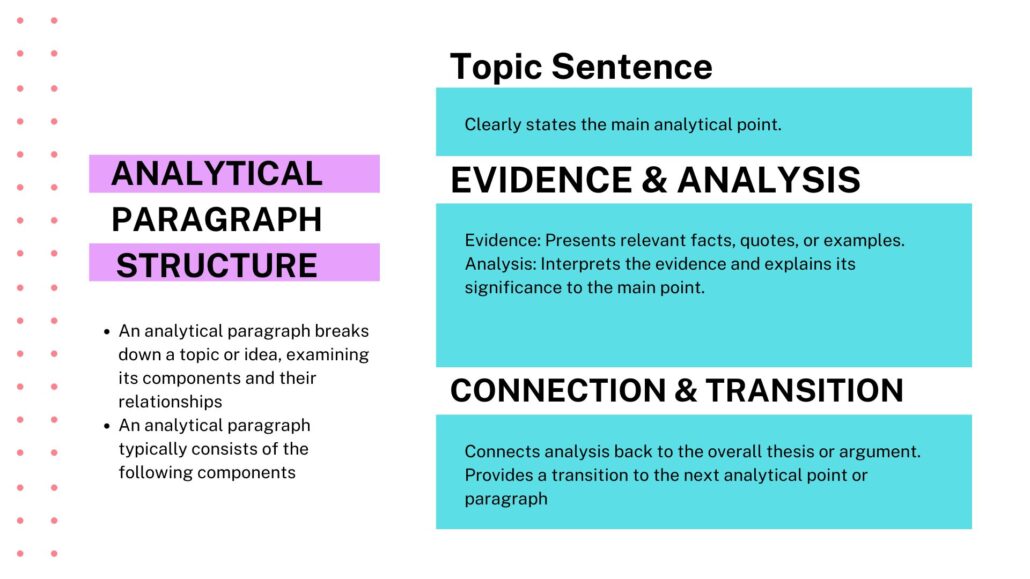
Analytical Paragraph Structure
An effective analytical paragraph typically follows this structure:
- Topic Sentence: Introduces the main idea of the paragraph and links it to your thesis.
- Context/Background: Provides any necessary background information for your point.
- Evidence: Presents specific examples, quotes, or data that support your point.
- Analysis: Explains how the evidence supports your argument and its significance.
- Transition: Connects this paragraph to the next, maintaining the flow of your essay.
Example Analytical Paragraph (Breakdown) Topic: The use of symbolism in F. Scott Fitzgerald’s “The Great Gatsby” Topic Sentence: The green light at the end of Daisy’s dock serves as a multifaceted symbol in “The Great Gatsby,” representing Gatsby’s hopes, dreams, and the elusive nature of the American Dream. Context: Throughout the novel, Gatsby is often seen reaching towards this light, which is physically distant yet tantalizing close. Evidence: “Gatsby believed in the green light, the orgastic future that year by year recedes before us. It eluded us then, but that’s no matter—tomorrow we will run faster, stretch out our arms farther…” (Fitzgerald, 180). Analysis: This quote, from the novel’s final passage, encapsulates the dual nature of the green light symbol. On one level, it represents Gatsby’s personal desire for Daisy, always visible yet unattainable. On a broader scale, it embodies the American Dream itself—a beacon of hope that drives people forward, even as it remains forever out of reach. Fitzgerald’s use of “us” in this passage expands the symbol’s significance beyond Gatsby to encompass a universal human experience. Transition: While the green light symbolizes hope and aspiration, Fitzgerald uses other symbols to represent the corruption and decay that lurk beneath the glittering surface of the Roaring Twenties.
Writing a Conclusion to Analytical Essay
The conclusion of your analytical essay should provide closure while reinforcing your main points. Here’s how to write an effective conclusion:
- Restate your thesis: Rephrase your main argument in light of the evidence you’ve presented.
- Summarize key points: Briefly recap the main arguments from your body paragraphs.
- Provide broader context: Explain the significance of your analysis in a larger context.
- End with a thought-provoking statement: Leave your reader with something to ponder.
The conclusion paragraph of an analytical essay summarizes the author’s main points and emphasizes the significance of the thesis statement. The conclusion’s goal is to leave a lasting impression on the reader by bringing the essay to a close and reinforcing the main argument .
To write a strong conclusion for your analytical essay, here are some tips to consider:
- Restate the thesis statement: The conclusion should restate the thesis statement in a new and meaningful way, emphasizing its importance and relevance to the topic.
- Summarize the main points: Summarize the main points of the essay, highlighting the evidence and examples that support the thesis statement.
- Provide a final thought: End the essay with a final thought or reflection on the topic, leaving the reader with something to think about or consider.
- Be concise: Keep the conclusion concise and to the point, avoiding any new information or arguments.
- Make it memorable: Use language and phrasing that is memorable and impactful, leaving a lasting impression on the reader.
Example of an Analytical Essay Conclusion
Topic: The impact of social media on political discourse
“As we’ve seen, the rise of social media has fundamentally altered the landscape of political communication, often prioritizing emotional appeal and brevity over nuanced discussion. The echo chambers created by algorithmic content curation, combined with the viral nature of sensationalist posts, have contributed to increased polarization and the spread of misinformation. While social media platforms have democratized access to political engagement, they have also fragmented our shared reality, making consensus and productive dialogue increasingly challenging. The implications of this shift extend far beyond individual political campaigns or movements. As society grapples with complex, global challenges like climate change and economic inequality, the quality of our political discourse becomes ever more critical. Moving forward, it is essential that we develop digital literacy skills and create online spaces that encourage thoughtful, fact-based discussions. Only by understanding and addressing the limitations of social media as a political forum can we hope to harness its potential for positive civic engagement. In the end, the power of social media in politics is a double-edged sword. It has the capacity to mobilize millions for social change, but also to divide and misinform. As users and citizens, the responsibility falls on us to approach these platforms critically, seek out diverse viewpoints, and strive for meaningful dialogue. The future of our democracy may well depend on our ability to navigate this new digital political landscape.”
This conclusion restates the thesis about social media’s impact on political discourse, summarizes key points about echo chambers and viral misinformation, provides broader context about the importance of quality political discourse, and ends with a thought-provoking statement about individual responsibility and the future of democracy.
Step 6:Editing and Proofreading Your Analytical Essay
The editing and proofreading stages of the essay writing process are critical. It ensures that the essay is clear, concise, and error-free, improving overall writing quality and the credibility of the arguments presented.
To edit and proofread your analytical essay, here are some tips to consider:
- 1. Take a break: After completing your essay, take a break before editing and proofreading it. This will allow you to approach the essay with fresh eyes and a clear mind.
- 2. Read it out loud: Reading the essay out loud can help you to identify awkward phrasing, grammatical errors, and other issues.
- 3. Be consistent: Ensure that you are consistent in your use of language, formatting, and citation styles throughout the essay.
- 4. Use a checklist: Use a checklist to ensure that you have addressed all the necessary components of the essay, such as the thesis statement, evidence, and analysis.
- 5. Get feedback: Ask a friend or colleague to read your essay and provide feedback on areas that need improvement.
Common mistakes to avoid in analytical essays include:
- 1. Using overly complicated language or jargon that may confuse the reader.
- 2. Failing to provide evidence or examples to support the thesis statement.
- 3. Neglecting to address counterarguments or alternative perspectives on the topic.
- 4. Making unsupported claims or presenting opinions as facts.
- 5. Failing to proofread and edit the essay thoroughly, leading to grammatical errors and typos.
By following these tips and avoiding common mistakes, you can edit and proofread your analytical essay effectively, producing a well-written and error-free piece of writing.
Analytical Essay Examples
Here are some examples of successful analytical essays:.
- 1. “The Symbolism of the Green Light in The Great Gatsby” by F. Scott Fitzgerald: This essay analyzes the symbolism of the green light in the novel, arguing that it represents Gatsby’s hopes and dreams and his ultimate failure to achieve them.
- 2. “The Rhetoric of Malcolm X” by Malcolm X: In this essay, Malcolm X analyzes his own rhetorical strategies, explaining how he uses language and persuasion to achieve his goals.
- 3. “The Role of Women in Shakespeare’s Macbeth” by William Shakespeare: This essay analyzes the role of women in the play, arguing that they are often marginalized and oppressed by the male characters.
- Read more Analytical Essay Examples
Each of these essays follows a clear and well-structured format, with a strong thesis statement, supporting evidence, and a clear conclusion. The writers use analysis and evaluation to present their arguments, using evidence and examples to support their claims.
When using analytical essay examples to improve your writing, here are some tips to consider:
- Choose examples that are relevant to your topic or subject matter.
- Read the example essays carefully, paying attention to the structure, language, and evidence used.
- Identify the thesis statement and main arguments of the essay.
- Analyze the evidence used to support the arguments, evaluating its relevance and credibility.
- Consider how the writer uses language and rhetoric to persuade the reader.
- Use The examples as a guide for structuring your own essay, but be sure to use your own unique ideas and perspective.
- Practice writing your own analytical essays and seek feedback from others to improve your writing skills.
- Avoid copying or plagiarizing the example essays, as this can lead to serious academic consequences.
Frequently Asked Questions
1. what is an analytical essay.
An analytical essay is a type of academic writing that requires the writer to analyze and evaluate a specific topic or subject matter. The writer presents an argument or thesis statement and supports it with evidence and examples, using analysis and evaluation to persuade the reader.
2. What are the main characteristics of an analytical essay?
The main characteristics of an analytical essay include:
- – A clear and concise thesis statement that presents the writer’s argument
- – Use of evidence and examples to support the argument
- – Analysis and evaluation of the evidence presented
- – Clear and logical structure, with well-developed paragraphs and transitions between them
- – Use of formal and academic language
- – Objective and impartial tone
3. What are some tips for writing an analytical essay?
Here are some tips for writing an analytical essay:
- – Choose a topic that interests you and that you can analyze in depth
- – Develop a clear and concise thesis statement that presents your argument
- – Use evidence and examples to support your argument, ensuring that they are relevant, reliable, and credible
- – Analyze and evaluate the evidence presented, demonstrating your critical thinking skills
- – Use a clear and logical structure, with well-developed paragraphs and transitions between them
- – Use formal and academic language, avoiding slang and colloquialisms
- – Edit and proofread your essay thoroughly, ensuring that it is error-free and well-written.
4. How to Write an Analytical Essay?
Writing an analytical essay involves several steps:
- Choose a topic: Select a subject that interests you and has enough depth for analysis.
- Develop a thesis: Formulate a clear, specific argument about your topic.
- Research: Gather relevant information from credible sources to support your analysis.
- Create an outline: Organize your thoughts and evidence into a logical structure.
- Write the introduction: Hook the reader, provide context, and state your thesis.
- Develop body paragraphs: Present your analysis with evidence and examples.
- Write the conclusion: Summarize your main points and reinforce your thesis.
- Edit and proofread: Refine your essay for clarity, coherence, and correctness.
- Focus on “how” and “why” questions rather than just “what” happened.
- Use evidence to support your claims.
- Maintain an objective tone throughout the essay.
- Ensure each paragraph connects back to your thesis.
5. How Do You Structure an Analytical Essay?
A typical analytical essay follows this structure:
- Hook to grab the reader’s attention
- Brief background information
- Thesis statement
- Topic sentence
- Evidence presentation
- Analysis of evidence
- Transition to the next point
- Restatement of thesis
- Summary of main points
- Final thoughts or call to action
Each body paragraph should focus on a single aspect of your argument. Ensure smooth transitions between paragraphs to maintain the flow of your essay.
6. How to Write an Analysis Essay?
Writing an analysis essay involves:
- Close reading of the subject (text, artwork, event, etc.)
- Identifying key elements, patterns, or themes
- Formulating a thesis about the significance of these elements
- Supporting your thesis with evidence and reasoning
Steps to follow:
- Read/observe your subject multiple times, taking notes.
- Identify the main elements or themes.
- Develop a thesis that explains the significance of these elements.
- Gather evidence to support your thesis.
- Organize your thoughts into a clear outline.
- Write your essay, ensuring each paragraph supports your thesis.
- Revise and refine your analysis.
Remember to go beyond mere description. Explain why certain elements are significant and how they contribute to the overall meaning or effect of the subject.
7. How Do You Structure an Analysis Essay?
An analysis essay typically follows this structure:
- Introduce the subject of analysis
- Provide brief context
- Present your thesis (main argument about the subject)
- Brief overview of the subject for readers unfamiliar with it
- Several paragraphs, each focusing on a specific aspect of your argument
- Present evidence and explain its significance
- Connect each point back to your thesis
- Summarize your main points
- Restate your thesis in light of the evidence presented
- Discuss broader implications of your analysis
Ensure that your analysis is the bulk of the essay. The summary should be brief, serving only to give context for your analysis.
8. Do You Need an Outline for an Analytical Essay?
While not always required, an outline is highly recommended for an analytical essay. Here’s why:
- Organization: An outline helps structure your thoughts logically.
- Focus: It keeps you centered on your main argument and prevents tangents.
- Balance: You can ensure each point receives appropriate attention.
- Efficiency: It makes the writing process smoother and often faster.
9. What Skills Do You Need to Write an Analytical Essay?
Writing an effective analytical essay requires several key skills:
- Critical Thinking: Ability to examine information objectively and make reasoned judgments.
- Close Reading/Observation: Skill to identify key elements, patterns, and themes in the subject of analysis.
- Research Skills: Capacity to find and evaluate relevant, credible sources.
- Logical Reasoning: Ability to construct and support arguments with evidence.
- Clear Communication: Skill to express complex ideas clearly and concisely.
- Organization: Ability to structure information and ideas coherently.
- Analysis: Capacity to break down complex topics into components and understand their relationships.
- Synthesis: Skill to combine various pieces of information to form a cohesive argument.
- Objectivity: Ability to set aside personal biases and examine topics impartially.
- Attention to Detail: Skill to notice and interpret subtle elements that contribute to the overall analysis.
- Academic Writing: Familiarity with formal writing conventions, including proper citation methods.
- Revision Skills: Ability to critically review and improve your own work.
Developing these skills takes practice. Regular reading, writing, and engaging in critical discussions can help improve your analytical abilities over time.
- To summarize, writing an effective analytical essay necessitates a thorough understanding of the subject matter, a well-developed thesis statement, strong evidence and analysis, and a clear and logical structure. To summarize the main points covered in this guide:
- – The writer of an analytical essay must analyze and evaluate a specific topic or subject matter.
- – A clear thesis statement, evidence and examples to support the argument, analysis and evaluation of the evidence, a clear and logical structure, formal and academic language, and an objective tone are the main characteristics of an analytical essay.
- – Choosing a relevant topic, developing a clear thesis statement, using credible evidence and examples, analyzing and evaluating the evidence, using a clear and logical structure, using formal and academic language, and thoroughly editing and proofreading the essay are all tips for writing a successful analytical essay.
An effective analytical essay demonstrates critical thinking skills as well as the ability to analyze and evaluate complex issues. It is an important skill for both academic and professional success.
Finally, practicing writing on a regular basis, seeking feedback from others, and reading and analyzing examples of successful analytical essays can all help you improve your own writing skills.
Start by filling this short order form order.studyinghq.com
And then follow the progressive flow.
Having an issue, chat with us here
Cathy, CS.
New Concept ? Let a subject expert write your paper for You
Post navigation
Previous post.
📕 Studying HQ
Typically replies within minutes
Hey! 👋 Need help with an assignment?
🟢 Online | Privacy policy
WhatsApp us

IMAGES
VIDEO